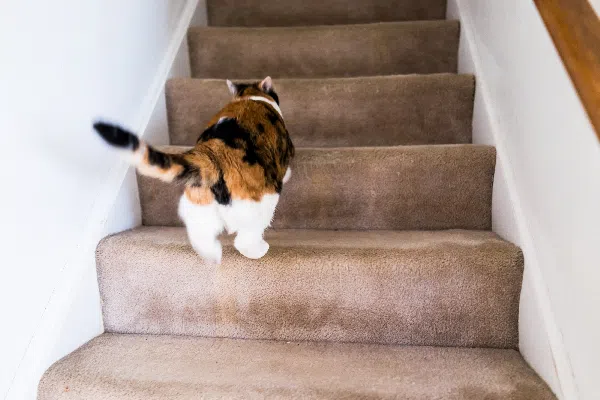Why does my cat follow me? You are not alone! Find out why your cat – even a stray – follows you.
My cat Mimosa usually follows me when I go to the kitchen. I’ve always assumed it’s because she likes treats. Mimosa’s snacks are on the counter, and her nightly wet food is in a bowl in the kitchen cabinet. For Mimosa, she gets lucky every time I come into the kitchen. However, there may be more reasons than that for cats to follow their humans. If you are asking yourself “Why do cats follow you?

Ever wondered, “Why does my cat follow me?” You’re not the only kitty parent out there! Photography ©krblokhin | iStock / Getty Images Plus.
Why does the cat follow me? This could be kitten-like behavior.
To the question “Why do cats follow me?” One answer to this question is that cats following you may be a learned behavior from kittenhood. While cats are often thought of as independent animals, kittens will learn to live by following their mothers. This is sometimes referred to as the mother-cat bond.
Kittens will soon learn that following their mother provides food, play, safety and affection.
Jacqueline Munera, a certified cat behavior consultant with the International Association of Animal Behavior Consultants, adds that these positive interactions, which include licking such as brushing and petting, help build the bond between cats and humans.
Some cats are curious and like to see what their humans are doing. Some cats seem to enjoy their time with their humans and will follow them around the house. There is a dark side to this close relationship, and cats can be distressed when separated from their humans.”
So the next time you wonder, “Why does my cat follow me?” the first answer may be the role of learned behavior.
Why does my cat follow me?
Why does my cat follow me? Wondering “Why does my cat follow me?” The second question to ask after that is whether your cat’s habit of following you is an expression of love.
“It’s such a compliment to be voted the most popular individual!” Jacqueline said.” Jacqueline says, “It means that the cat is choosing to spend time by your side and within your sphere of activity.
Cats may miss you, especially if you are away from home all day for work. This is more pronounced if you are away from home all day for work. This may manifest itself by the cat following you when you come home and acting as if it is playing and petting you.
How should you respond to your cat following you or other affectionate behavior?
When your cat follows you, you should always acknowledge and reciprocate your cat’s affection for you.
Jacqueline says, “The best way to respond depends on the cat’s preferences. Some cats like interactive play, while others are less interactive and just want to be around you.
When returning affection, it’s a good idea to try to find out where your cat likes to be stroked or flicked. Most cats like to be stroked on the chin, cheeks and top of the head,” says Jacqueline. Some cats like to be stroked on the back near the base of the tail, while others like to be stroked or patted on the belly.
Owners can learn more about their cat’s body language to better understand their cat’s communication signals,” she adds.
Why are feral cats following you?
You may have already answered the question ‘why is the cat following me’, but what should you do if you find a stray cat following you?
First of all, Jacqueline points out that if a cat exhibits “friendly or amicable behavior,” then it has likely been “socialized by humans and is not a feral cat.”
In most cases, this cat is a friendly indoor/outdoor cat that uses its outdoor privileges. If the cat seems friendly, don’t hesitate to pet it. And introduce yourself appropriately. (Also, wash and sanitize your hands when you get home).
If the cat has been chasing you outdoors, it may be a stray indoor cat. Check to see if the cat has a collar or tags. Scan local listings and social media alerts to see if anyone is looking for a cat with a similar description.
If the cat doesn’t seem friendly, Jacqueline suggests watching the cat’s behavior to determine if it’s intimidated or frightened. However, “most feral cats will leave humans alone, so this is usually not a very common problem. Check to see if the cat’s ears are tilted, which is a universal sign that a feral cat has been spayed or neutered. If not, consider having them spayed or neutered through your local TNR program.
By Phillip Mlynar , June 18, 2020 
